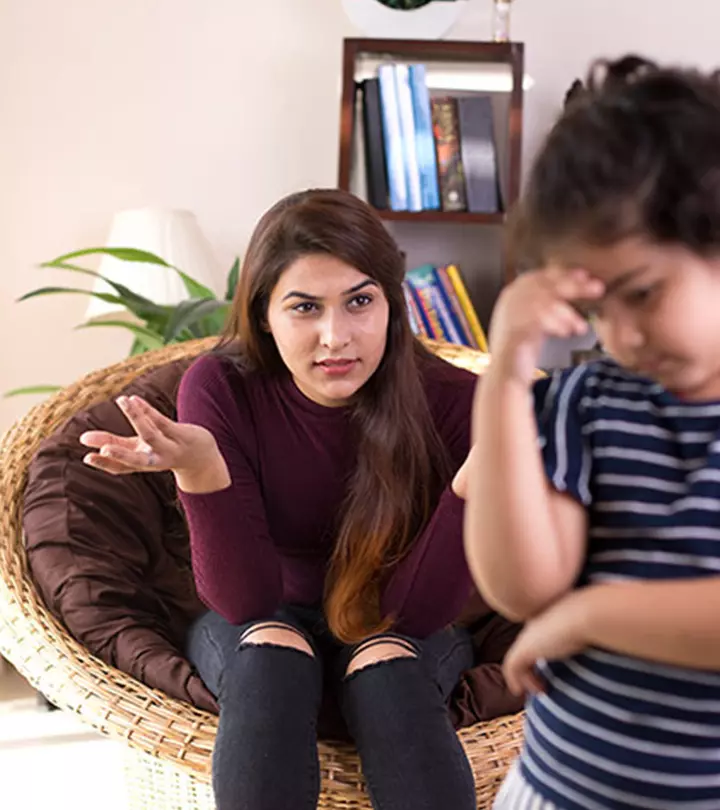
Image: Shutterstock
Young children often deal with various problems of their own – real or imagined fear, a new social situation, parental discord, bullying, or physical and emotional threats from known or unknown persons. Irrational fears (phobias) or separation anxiety from parents can often push everyday stress to chronic anxiety disorders. Kids in such situations will have difficulty navigating through their daily lives, being terrified, depressed, self-conscious, unwilling to face their triggers, and underconfident (1).

Learning to cope with fears is difficult, especially if they remain undeciphered. As parents, you will want to comfort your kids to help them calm down, but often parents will find it difficult as children wouldn’t confide their secrets with them easily. Besides, at times it’s also important to let children solve their own problems without their parents stepping in for every little issue. When parents are always there to jump in and make changes to fix and allay their child’s fears, in the long run, it becomes more difficult for the kid to learn or use the trigger situation as an opportunity to adapt and grow.
As parents, you need to teach your kids to self-regulate and manage their fears and anxiety without excessive interventions. This way, they’ll feel more confident and in control of their emotions while they navigate into their adult lives. So, you don’t leave them to deal with their fears alone or solve the problem for them entirely. If you are struggling to help your child move past their fears, here are a few ways in which you could try to address and diffuse them:
1. Figure Out Their Concern

Image: IStock
The first step to helping your kid overcome their fears and anxiety is to figure out what’s bothering them. While they may not often feel comfortable sharing them right away, look at their behavior or even pick cues from their body language: rapid breathing, thumping heart, nausea, getting startled easily, crying or throwing tantrums, suffering from frequent headaches or stomach aches, are signs your child is anxious and gripped with fear (2).
When fear takes root and is left unresolved, the suffering could drive people into depression or suicidal tendencies (3)
As parents, you want your kids to be happy and build them into confident and self-assured adults. But when they withdraw from their regular routine and feel disoriented, it doesn’t just disturb their sense of peace and happiness, but yours too!

Image: IStock
Your child should feel comfortable to open up to you. If they are scolded, rebuked, or humiliated for their “imaginary” fears, they’ll end up withdrawing themselves furthermore. Helping your child become brave doesn’t mean you leave them all alone, refusing to offer support. You’ll have to provide gentle reminders and a few nudges until they are ready to face their fears head-on.
If your kid struggles to explain what they’re scared of, asking them concise questions may help. Ask questions like: “What scares you about the darkroom?”, “Is there somebody there who scares you?”, “What do you imagine happening if you were left there all by yourself?”. Some kids may not express themselves well, so confirm what you deciphered over the conversation with them. You could say something like, “So, you mean the darkroom reminds you of the ghost in the movie we saw last week. Did I get that right?”.
Alternatively, you could read out bedtime stories or watch an inspirational movie with them. Choose a story or movie theme that revolves around their underlying fears. Focus on the lead character who overcame their fear triggers. It should inspire your child to emulate their footsteps to feel relaxed and less troubled.
3. Simplify It Logically

Image: IStock
Once you’ve patiently listened to their concerns, help them understand if it is a fact or just a feeling that is changeable. If the belief they harbor is wrong, collect some evidence or find creative ways to prove that they could be mistaken. For instance, spend some time alone in the dark and let them check in on you at frequent intervals. When you get back to them after some time, explain that nothing in the darkroom caused you to be in danger. They’ll slowly understand that there’s no ghost inside that’ll harm them or you.
Challenging their unreal thoughts with the correct facts (with love and compassion) will slowly convince your child that the fear and the anxiety triggers are imaginary.
4. Encourage Them Consistently

Image: IStock
There is no standard rule for how many trials it would take to help them get over their fears. So, you’ll have to be consistent in offering encouragement to your child. Change takes time. In addition, fear can have a crippling effect on your child. Therefore, be patient and praise your kids’ efforts.
Observe and appreciate their progress. Even if your child shows that they aren’t capable of tackling their fears just yet, it’s vital to make them think that they can and will do better eventually. Saying things like “You’ve got this!”, “I know you can do it”, can boost their self-esteem. It might take a few tries before they win over their fears but don’t give up on building their bravery. Your children look up to you for support — provide them an abundant supply of it!
Offer real-life examples of overcoming fear by sharing similar stories of your own or those that you are mutually connected to. It will boost their confidence to deal with their own issues proactively!
A fearless mind can enable children to feel safe and secure, and also help them grow healthy, learn and solve problems better. Whether or not certain things make sense to us, they could be incredibly scary thoughts or experiences for your child. Always seek help from a professional before it assumes a worse shape. It could result in a false reality that controls them lifelong. Does your child harbor irrational fears? How did you help your little one overcome them? Do share your stories with us in the comments below!
References
- How serious are common childhood fears? II. The parent’s point of view
https://pubmed.ncbi.nlm.nih.gov/10937429/ - Assessment and Treatment of Anxiety Among Children and Adolescents
https://www.ncbi.nlm.nih.gov/pmc/articles/PMC6526964/ - Understanding the Impact of Trauma
https://www.ncbi.nlm.nih.gov/books/NBK207191/
Community Experiences
Join the conversation and become a part of our nurturing community! Share your stories, experiences, and insights to connect with fellow parents.












